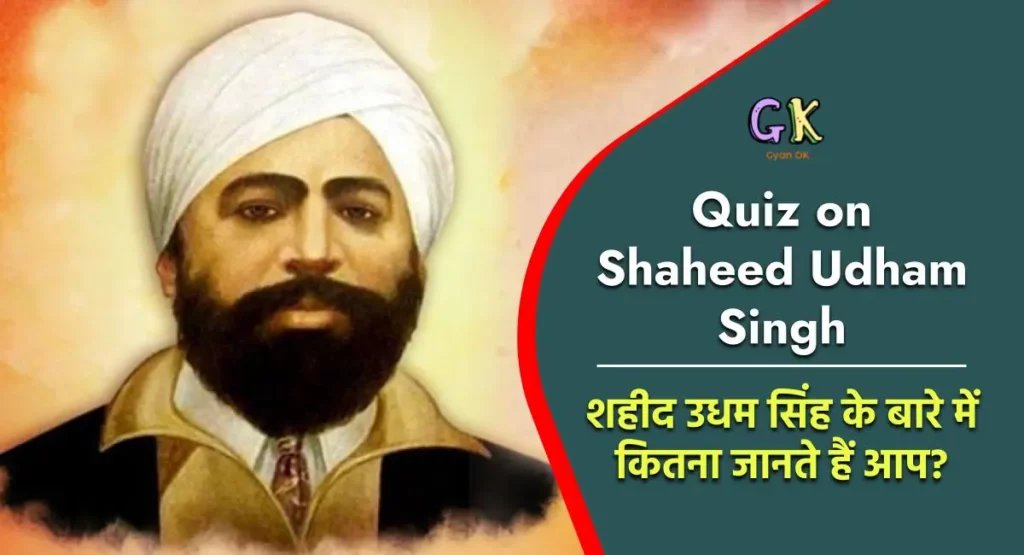Shaheed Udham Singh, an immensely determined and unyielding freedom fighter, embodied extraordinary courage and unwavering resolve in his pursuit of justice. His vengeful act in avenging the Jallianwala Bagh massacre showcased his indomitable spirit, driven by an unshakeable sense of righteousness. To commemorate his heroic legacy, we’ve prepared a quiz that delves into his life and sacrifices, allowing others to honour his memory and learn from his courageous deeds.

General Knowledge Quiz on Shaheed Udham Singh
Udham Singh, a true embodiment of courage, displayed remarkable valor through his relentless pursuit of justice. His most audacious act was the assassination of Michael O’Dwyer, the former British Lieutenant Governor of Punjab, in 1940, at London’s Caxton Hall. This act was a direct response to the horrific Jallianwala Bagh massacre of 1919, where hundreds of unarmed Indians were mercilessly killed. Singh’s unwavering determination to avenge this atrocity, despite the passage of two decades and the long journey from India to England, showcased his extraordinary courage and commitment to his cause. His actions resonated globally as a symbol of resistance against colonial oppression and continue to inspire generations seeking justice and freedom.
Following we have provided MCQs on Shaheed Udham Singh to help you gain insights through the process.
Q1. When was Udham Singh born?
[A] 26 December 1899
[B] 25 December 1898
[C] 24 December 1897
[D] 23 December 1895
Answer: [B] 25 December 1898
Q2. Which among the following places was the birthplace of Udham Singh?
[A] Maharashtra
[B] Punjab
[C] Uttar Pradesh
[D] Haryana
Answer: [B] Punjab
Q3. What was the birth name of Udham Singh?
[A] Mahavir Singh
[B] Mukta Singh
[C] Sher Singh
[D] None of the above
Answer: [C] Sher Singh
Q4. Udham Singh got influenced by ________ and his revolutionary group?
[A] Chandra Shekhar Azad
[B] Ramprasad Bismil
[C] Subhash Chandra Bose
[D] Bhagat Singh
Answer: [D] Bhagat Singh
Q5. In 1934, Udham Singh assassinated whom in London as revenge for the Jallianwala Bagh Massacre?
[A] Michael O’Dwyer
[B] Reginald Dyer
[C] Lord Curzon
[D] None of the above
Answer: [A] Michael O’Dwyer
Q6. In 1927, Why was Udham Singh arrested and sentenced for 5 years in jail?
[A] For Protesting
[B] For possession of unlicensed arms
[C] For attacks
[D] For starting his own revolutionary group
Answer: [B] For possession of unlicensed arms
Q7. Udham Singh, while waiting for his trial period, went on a hunger strike for how many days?
[A] 40
[B] 41
[C] 43
[D] 42
Answer: [D] 42
Q8. After the repatriation of Udham Singh’s body, in which river were his ashes scattered?
[A] River Ganga
[B] River Yamuna
[C] River Sutlej
[D] None of the above
Answer: [A] River Ganga
Q9. When did he shoot Michael O’Dwyer in London?
[A] 13 March 1940
[B] 13 April 1945
[C] 13 June 1942
[D] 13 July 1946
Answer: [A] 13 March 1940
Q10. When did Udham Singh die?
[A] 31 July 1944
[B] 31 July 1940
[C] 31 July 1946
[D] 31 July 1945
Answer: [B] 31 July 1940
Biography of Shaheed Udham Singh
Shaheed Udham Singh, a name etched in the history of India’s struggle for independence, was born on December 26, 1899, in the peaceful village of Sunam in the Sangrur district of Punjab. Born as Sher Singh, he grew up in a period when the Indian subcontinent was still under British colonial rule, and his life was destined to be intricately woven with the fight against this oppressive regime.
Udham Singh’s early life was marked by tragedy and hardship. At the tender age of six, he witnessed a horrific event that would forever shape his destiny – the Jallianwala Bagh massacre in 1919. This brutal and senseless massacre, orchestrated by General Reginald Dyer, left an indelible mark on young Udham Singh’s mind. The sight of innocent Indian men, women, and children being mercilessly gunned down left an enduring scar, and he vowed to seek retribution for this heinous act of violence.
In his quest for justice, Sher Singh adopted the name Udham Singh. He became involved in various political activities aimed at freeing India from British colonial rule. His journey took him to various countries, including the United States, where he was exposed to the ideas of revolutionaries and freedom fighters. His travels imbued him with a sense of purpose and determination to avenge the Jallianwala Bagh massacre.
Udham Singh’s defining moment came on March 13, 1940, when he assassinated Michael O’Dwyer, the former Lieutenant Governor of Punjab, in London. He carefully planned and executed this act of retribution, believing it to be his solemn duty to avenge the innocent lives lost in Amritsar over two decades earlier. He was captured after the assassination and willingly accepted his fate, uttering the famous words, “I did it because I had a grudge against him. He deserved it. He was the real culprit.”
Udham Singh’s act of courage and sacrifice resonated deeply with the people of India and freedom fighters across the world. He was hailed as a hero and a symbol of resistance against British oppression. His actions were not those of a lone gunman seeking revenge but were viewed as an embodiment of the collective pain and anger of millions of Indians who longed for freedom.
While awaiting trial in London, Udham Singh went on a hunger strike for 42 days, demanding that he be treated as a political prisoner and not a common criminal. His determination and resilience during this period further underscored his unwavering commitment to the cause of India’s independence. His sacrifice behind bars brought international attention to the Indian freedom struggle.
Tragically, Udham Singh never saw an independent India. On July 31, 1940, he was executed by hanging in London’s Pentonville Prison. However, his sacrifice did not go in vain. His actions served as an inspiration to countless others who continued to fight for India’s freedom. His legacy lived on as a beacon of hope and courage.
After India gained independence in 1947, Udham Singh’s mortal remains were repatriated to his homeland. In a poignant moment, his ashes were scattered in the River Ganga, symbolizing his return to the land he had passionately yearned to see free.
Udham Singh’s life and actions continue to be celebrated in India and among those who admire his unwavering commitment to justice. He remains a symbol of sacrifice and a reminder that the pursuit of freedom often demands immense personal sacrifice. His story reminds us of the enduring power of courage and conviction in the face of tyranny and oppression, and his name is forever etched in the history of India’s struggle for independence as a true martyr and hero.





